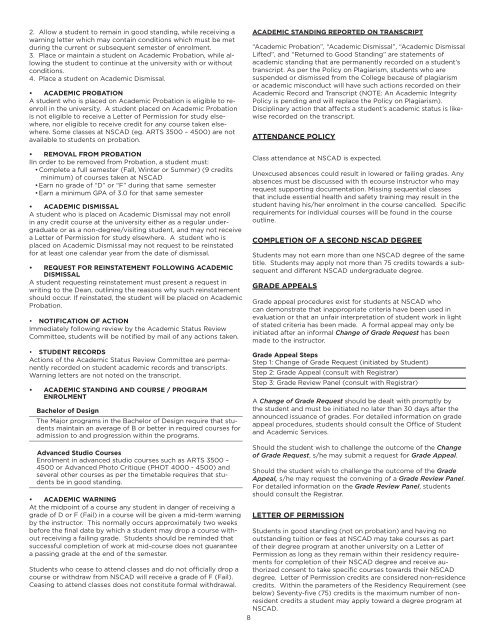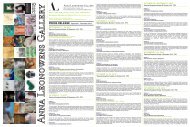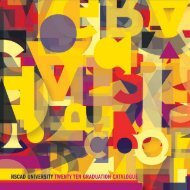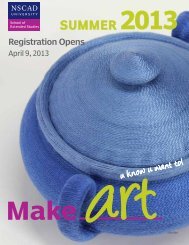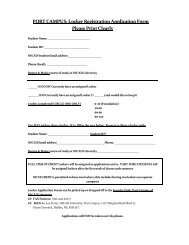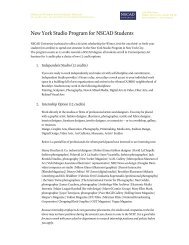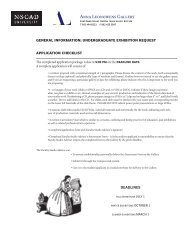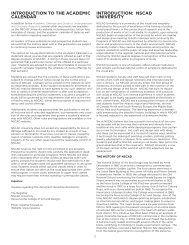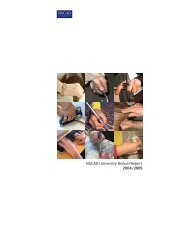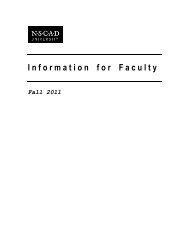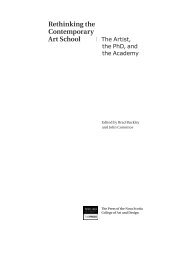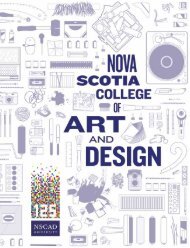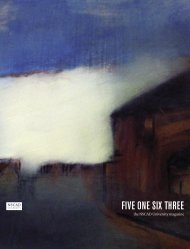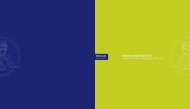CONTENTS - Nova Scotia College of Art and Design
CONTENTS - Nova Scotia College of Art and Design
CONTENTS - Nova Scotia College of Art and Design
You also want an ePaper? Increase the reach of your titles
YUMPU automatically turns print PDFs into web optimized ePapers that Google loves.
2. Allow a student to remain in good st<strong>and</strong>ing, while receiving a<br />
warning letter which may contain conditions which must be met<br />
during the current or subsequent semester <strong>of</strong> enrolment.<br />
3. Place or maintain a student on Academic Probation, while allowing<br />
the student to continue at the university with or without<br />
conditions.<br />
4. Place a student on Academic Dismissal.<br />
• ACADEMIC PROBATION<br />
A student who is placed on Academic Probation is eligible to reenroll<br />
in the university. A student placed on Academic Probation<br />
is not eligible to receive a Letter <strong>of</strong> Permission for study elsewhere,<br />
nor eligible to receive credit for any course taken elsewhere.<br />
Some classes at NSCAD (eg. ARTS 3500 – 4500) are not<br />
available to students on probation.<br />
• REMOVAL FROM PROBATION<br />
IIn order to be removed from Probation, a student must:<br />
• Complete a full semester (Fall, Winter or Summer) (9 credits<br />
minimum) <strong>of</strong> courses taken at NSCAD<br />
• Earn no grade <strong>of</strong> “D” or “F” during that same semester<br />
• Earn a minimum GPA <strong>of</strong> 3.0 for that same semester<br />
• ACADEMIC DISMISSAL<br />
A student who is placed on Academic Dismissal may not enroll<br />
in any credit course at the university either as a regular undergraduate<br />
or as a non-degree/visiting student, <strong>and</strong> may not receive<br />
a Letter <strong>of</strong> Permission for study elsewhere. A student who is<br />
placed on Academic Dismissal may not request to be reinstated<br />
for at least one calendar year from the date <strong>of</strong> dismissal.<br />
• REQUEST FOR REINSTATEMENT FOLLOWING ACADEMIC<br />
DISMISSAL<br />
A student requesting reinstatement must present a request in<br />
writing to the Dean, outlining the reasons why such reinstatement<br />
should occur. If reinstated, the student will be placed on Academic<br />
Probation.<br />
• NOTIFICATION OF ACTION<br />
Immediately following review by the Academic Status Review<br />
Committee, students will be notified by mail <strong>of</strong> any actions taken.<br />
• STUDENT RECORDS<br />
Actions <strong>of</strong> the Academic Status Review Committee are permanently<br />
recorded on student academic records <strong>and</strong> transcripts.<br />
Warning letters are not noted on the transcript.<br />
• ACADEMIC STANDING AND COURSE / PROGRAM<br />
ENROLMENT<br />
Bachelor <strong>of</strong> <strong>Design</strong><br />
The Major programs in the Bachelor <strong>of</strong> <strong>Design</strong> require that students<br />
maintain an average <strong>of</strong> B or better in required courses for<br />
admission to <strong>and</strong> progression within the programs.<br />
Advanced Studio Courses<br />
Enrolment in advanced studio courses such as ARTS 3500 –<br />
4500 or Advanced Photo Critique (PHOT 4000 - 4500) <strong>and</strong><br />
several other courses as per the timetable requires that students<br />
be in good st<strong>and</strong>ing.<br />
• ACADEMIC WARNING<br />
At the midpoint <strong>of</strong> a course any student in danger <strong>of</strong> receiving a<br />
grade <strong>of</strong> D or F (Fail) in a course will be given a mid-term warning<br />
by the instructor. This normally occurs approximately two weeks<br />
before the final date by which a student may drop a course without<br />
receiving a failing grade. Students should be reminded that<br />
successful completion <strong>of</strong> work at mid-course does not guarantee<br />
a passing grade at the end <strong>of</strong> the semester.<br />
Students who cease to attend classes <strong>and</strong> do not <strong>of</strong>ficially drop a<br />
course or withdraw from NSCAD will receive a grade <strong>of</strong> F (Fail).<br />
Ceasing to attend classes does not constitute formal withdrawal.<br />
ACADEMIC STANDING REPORTED ON TRANSCRIPT<br />
“Academic Probation”, “Academic Dismissal”, “Academic Dismissal<br />
Lifted”, <strong>and</strong> “Returned to Good St<strong>and</strong>ing” are statements <strong>of</strong><br />
academic st<strong>and</strong>ing that are permanently recorded on a student’s<br />
transcript. As per the Policy on Plagiarism, students who are<br />
suspended or dismissed from the <strong>College</strong> because <strong>of</strong> plagiarism<br />
or academic misconduct will have such actions recorded on their<br />
Academic Record <strong>and</strong> Transcript (NOTE: An Academic Integrity<br />
Policy is pending <strong>and</strong> will replace the Policy on Plagiarism).<br />
Disciplinary action that affects a student’s academic status is likewise<br />
recorded on the transcript.<br />
ATTENDANCE POLICY<br />
Class attendance at NSCAD is expected.<br />
Unexcused absences could result in lowered or failing grades. Any<br />
absences must be discussed with th ecourse instructor who may<br />
request supporting documentation. Missing sequential classes<br />
that include essential health <strong>and</strong> safety training may result in the<br />
student having his/her enrolment in the course cancelled. Specific<br />
requirements for individual courses will be found in the course<br />
outline.<br />
COMPLETION OF A SECOND NSCAD DEGREE<br />
Students may not earn more than one NSCAD degree <strong>of</strong> the same<br />
title. Students may apply not more than 75 credits towards a subsequent<br />
<strong>and</strong> different NSCAD undergraduate degree.<br />
GRADE APPEALS<br />
Grade appeal procedures exist for students at NSCAD who<br />
can demonstrate that inappropriate criteria have been used in<br />
evaluation or that an unfair interpretation <strong>of</strong> student work in light<br />
<strong>of</strong> stated criteria has been made. A formal appeal may only be<br />
initiated after an informal Change <strong>of</strong> Grade Request has been<br />
made to the instructor.<br />
Grade Appeal Steps<br />
Step 1: Change <strong>of</strong> Grade Request (initiated by Student)<br />
Step 2: Grade Appeal (consult with Registrar)<br />
Step 3: Grade Review Panel (consult with Registrar)<br />
A Change <strong>of</strong> Grade Request should be dealt with promptly by<br />
the student <strong>and</strong> must be initiated no later than 30 days after the<br />
announced issuance <strong>of</strong> grades. For detailed information on grade<br />
appeal procedures, students should consult the Office <strong>of</strong> Student<br />
<strong>and</strong> Academic Services.<br />
Should the student wish to challenge the outcome <strong>of</strong> the Change<br />
<strong>of</strong> Grade Request, s/he may submit a request for Grade Appeal.<br />
Should the student wish to challenge the outcome <strong>of</strong> the Grade<br />
Appeal, s/he may request the convening <strong>of</strong> a Grade Review Panel.<br />
For detailed information on the Grade Review Panel, students<br />
should consult the Registrar.<br />
LETTER OF PERMISSION<br />
Students in good st<strong>and</strong>ing (not on probation) <strong>and</strong> having no<br />
outst<strong>and</strong>ing tuition or fees at NSCAD may take courses as part<br />
<strong>of</strong> their degree program at another university on a Letter <strong>of</strong><br />
Permission as long as they remain within their residency requirements<br />
for completion <strong>of</strong> their NSCAD degree <strong>and</strong> receive authorized<br />
consent to take specific courses towards their NSCAD<br />
degree. Letter <strong>of</strong> Permission credits are considered non-residence<br />
credits. Within the parameters <strong>of</strong> the Residency Requirement (see<br />
below) Seventy-five (75) credits is the maximum number <strong>of</strong> nonresident<br />
credits a student may apply toward a degree program at<br />
NSCAD.<br />
8


